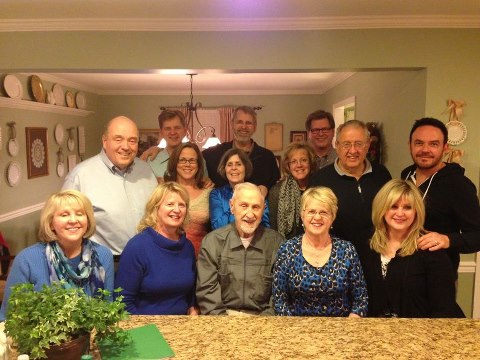The Last Family Fight
We just don’t argue anymore.
I spent the weekend with my six brothers and sisters—along with all our husbands and wives, except for my brother-in-law Larry in Kuwait. We were in Knoxville for a late celebration of my father’s 94th birthday. And we didn’t argue or fight.
Which is saying something in this family.
Twenty or thirty years ago we could hardly get to the annual reunion (in those days it was Nebraska), put our suitcases in our rooms, get some of Mom’s goulash (which she always made for hungry travelers come home) and sit down in the living room to start arguing. Our topics were nothing unusual—religion and politics—but our tactics and intensity were. We got exercised fast. And we got personal. There were tears, accusations, people sometimes left the reunion early and drove home hundreds of miles in protest.
When I think of how superior and self-righteous and condescending I was in my late twenties I can only shake my head.
A few years ago the seven of us (we’re all over fifty now) started noticing that our children were replicating the family pattern. They were extremely close—loved their kin and wouldn’t miss a reunion—but they were constantly waging ideological war. How could we get them to tone it down?
Answer: wait twenty or thirty years.
We’ve stopped jousting and fighting at family reunions not just because we have finally figured out that arguing changes no one’s mind, but because the whole basis of our relationship has slowly dropped about eighteen inches, from the mind to the heart. All the arguments live in the mind. They need all that frantic, anxious, arrogant energy. But after a while, most people just get tired of all that point-counterpoint. It doesn’t amount to a hill of beans. No one is happier, no one is wiser, no one is laughing and telling immortal family stories.
I don’t think it’s possible—maybe not even wise—to tell our kids at our reunions to stop debating each other into a lather at 3 AM. Near as I can tell, there’s no way to figure out how pointless it is to argue with people who share your blood and genes and history . . . until you just get tired of it. Then you look at these people and wonder how you could possibly have wasted so much precious time.
The wonder is not that you love them, but that—despite all your hectoring—they love you.

Hey, David, beautiful family story. Thanks. The image that came to me was of two prize fighters after a long bout, and only as complete exhaustion overtakes them, hugging one another, each with his gloved fists behind the other’s back. The word “hectoring” in your last sentence, reminded me of the Iliad, where after a ten year battle, Priam, who has lost all of his sons in the conflict, meets with his prime enemy, Achilles, who himself has lost his best and dearest friend, and the two men weep togeher. Priam is there because Achilles has killed his son, Hector, and he is begging Achilles to give the body back so that he can give it a proper burial. The old man says, “I am more to be pitied…for I have endured what no mortal ever endured: I have kissed the hand of the man who slaughtered my children.”
Thanks for the memories. With my dad now near 97, there are more reasons than ever for the family to communicate (caring for him, caring for his house, caring for one-another)and I find myself regreting that we did not have more sharp exchanges about views and contrary views. Earlier debates firm up mental and emotional muscles needed for later, probably more important, decision making. Best, leslie
David, A wonderful family and at peace with each other thanks be!
Thanks for this timely piece. I am taking a car trip today with my sister. She and I have just recently decided to “bury the hatchet”, and I have worried about what we will talk about. Funny how as time passes being right becomes less important and being “right” becomes everything. 🙂
Nailed it!